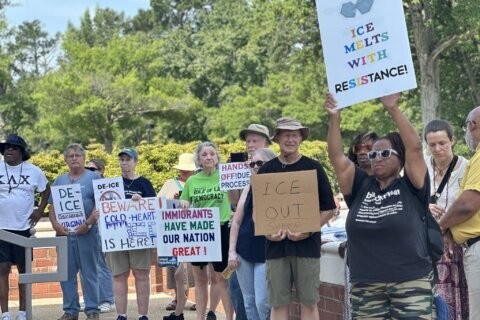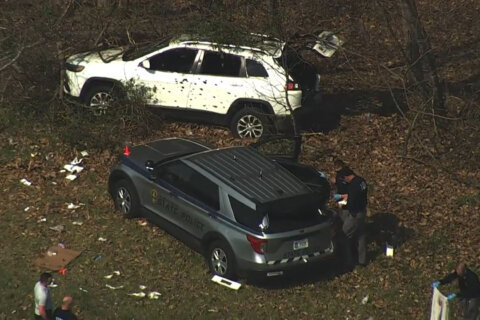This article was republished with permission from WTOP’s news partner InsideNoVa.com. Sign up for InsideNoVa.com’s free email subscription today.
This article was written by WTOP’s news partner InsideNoVa.com and republished with permission. Sign up for InsideNoVa.com’s free email subscription today.
A series of OmniRide service reductions could be the first sign of long-term trouble for the transit operator as 2020, and federal money that has helped it maintain service through the COVID-19 pandemic, comes to an end.
Last week, the Potomac and Rappahannock Transportation Commission, which operates the bus service, announced a host of changes to reduce expenses that will take effect Nov. 2. Three commuter routes – Dale City to Mark Center, Lake Ridge to Mark Center and Woodbridge VRE to Tysons Corner – will be suspended until further notice. A number of other commuter lines will be moved to a reduced Friday schedule, including three Dale City lines, Haymarket to Rosslyn, Gainesville to Washington and the South Route 1 line.
A spokesperson for OmniRide said the changes and service levels would remain in place for the foreseeable future, to be re-evaluated in 2021. PRTC Board Chair and Woodbridge District Supervisor Margaret Franklin said the reductions are intended to help the provider stave off potential payroll reductions amid lower revenues during the COVID-19 pandemic.
CARES Act funding has kept the transit service whole through the pandemic, but that funding runs out at the end of the year. Without another deal in Congress that helps to close the budget gap in the next fiscal year, more service cuts and layoffs would probably be necessary.
OmniRide officials couldn’t say exactly how big the hole might be for the next fiscal year, but Franklin said that if no federal assistance arrives for states and localities, as well as the transit agencies they help fund, the system could have to make more drastic operating reductions, including staff and service. The system should have a better sense of what the worst-case scenario looks like when it completes a fiscal audit that will be presented to the PRTC board at its next meeting, in November.
“In order to maintain a level of financial stability, cutting some of the routes that are not getting as much service makes the most sense,” Franklin told InsideNoVa.”We’re going to do things like that until we get to a place where we have to make some more dire decisions. But right now we’re fine, but we have to do things like that so we don’t get to a red spot.”
Metro operator WMATA, which is much larger, is facing its own $212 million budget gap in 2021 that could affect as many as 1,700 employees. Regionwide and across the country, rail ridership has taken a bigger hit from the COVID-19 pandemic than bus ridership, but OmniRide has seen a significant decline with many people who work in Washington telecommuting instead.
OmniRidge spokeswoman Alyssa Ludwiczak said ridership on the whole is still down by about half, with commuter numbers down 80%. For the three routes that were cut, it was down about 90%.
At the most recent PRTC board meeting, OmniRide Executive Director Bob Schneider said he hopes Congress could reach some sort of deal in the lame-duck session after the November election or at the start of the new Congress in 2021.
“We were very hopeful there would be some kind of CARES package,” Schneider said at the Oct. 1 board meeting. “We are not unique in this situation regarding transit concerns.”
Between declining toll revenues along Interstate 66 to fund the Northern Virginia Transportation Commission’s Commuter Choice program, lower fuel tax revenues, local budget tightening and diminished farebox revenues for transit, the whole region could be facing a steep decline in available funds for transportation operations and improvements in the next fiscal year.
A longtime proponent of mass transit in Northern Virginia, Del. Danica Roem, D-13th, told InsideNoVa that a priority for her is protecting the bus service in Haymarket and Gainesville from more cuts. As a member of the Northern Virginia Transportation Authority, Roem said she knows money is becoming tighter for many agencies, but that mass transit is still vital to the region’s future.
“We want to expand mass transit, we need to expand mass transit, that’s part of how we unclog our roads,” she said.







